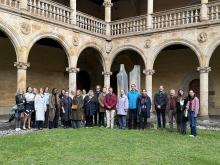Legal Mobilization and the Infrastructures of Protest Culture
Coordinators: Jeff Handmaker (Erasmus University Rotterdam), Mikel Diez Sarasola (Universidad del País Vasco UPV/EHU), Sanne Taekema (Professor of Legal Theory, Erasmus School of Law, Rotterdam), Michał Stambulski (Erasmus University Rotterdam)
Description of the meeting
Research Project-Proyecto de investigación.
IT1733-22. Gobernanza Multinivel y Derecho Europeo. Multilevel Governance and EU Law
Protests have long been a fundamental and controversial mechanism for citizens to voice their grievances and challenge authority. Yet in recent years, discussions about the legal limits of protests and their potential to transform contemporary democracies have intensified. In 2019 and 2023, Dutch farmers used farm machinery, blocking public roads protesting planned regulations limiting nitrogen emissions in industrial livestock production. In this case, the climate crisis, animal rights and the economic and labour interests of farmers collide, without a clear resolution. In 2020-21, a wave of “Black Protests” spread through Poland in a reaction to laws restricting abortion and what were seen as attacks on the constitution. The scale of the pro-choice street protests was unprecedented in the country’s history, yet they were not translated into changes in the law. Following a series of judicial decisions against the plans for the normalization of the Basque language in the public administration, a series of demonstrations and protests have and are taking place in the Basque Country calling into question the rule of law and constitutional premises as contrary to a certain conception of Basque collective identity. The protests raised questions about the relationship between protests and collective identities. In late 2023, the right to protest itself came under pressure in several European countries in response to, primarily youth protesting Israel’s warfare in Gaza. Outside Europe, in 2019-20, Egypt saw a series of pro-democratic street protests against President Abdel Fattah el-Sisi, echoing the Arab Spring protests of 2011. Security forces responded with tear gas, rubber bullets and mass arrests of lawyers, human rights defenders, activists and opposition leaders. Similar developments, resembling the "pattern" of the Arab Spring and also prompting European reactions, took place in 2019-2022 in Sudan. This raises into question the impediments for democratic mobilization and the transferability and limits of European democratic values.
The aim of workshop is to undertake an analysis of the moral, legal and social dynamics of contemporary protests and their influence on political institutions. At the heart of the project is the question of the possibility of enhancing the impact of contemporary protest on the representativeness, pluralism, openness, effectiveness, and dialogue of contemporary democratic and rule-of-law based political systems. To this end, it is necessary to understand how the infrastructure of protests functions and how protest interlinks with other forms of political engagement and participation such as voting and everyday parliamentary decision making.
Workshop Coordination Team
Avenida de la Universidad, 8
Apartado 28
20560 Oñati (Gipuzkoa) - Spain
T: +34 943 78... Ver teléfono
E: workshop@iisj.es




